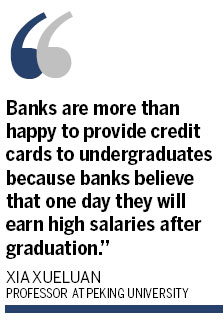Business
More university students lured by credit card freebies
By Zhong Nan (China Daily)
Updated: 2010-10-15 11:00
 |
Large Medium Small |
BEIJING - Zhao Yongfeng, a third-year undergraduate majoring in information engineering at the Beijing University of Posts and Telecommunications, has three unused credit cards in his wallet.
He applied for these cards two years ago shortly after he started university. What really lured him were the gifts offered by promoters hired by various banks.
"The salespeople told me that I can get gifts for applying for a credit card and that I don't need to phone the service center to activate the card," he said.
"I got a laptop bag, vacuum cup, table lamp and a dozen cinema tickets." And he didn't pay a cent for the cards.
Zhao is among a rising group of students who have become credit card holders as banks attempt to attract young consumers.
The total number of credit cards issued by Chinese banks reached 207 million by the end of June.
But lax supervision on issuing credit cards, especially to students who cannot provide income statements, has triggered worries that China may experience a credit crunch, similar to what happened in the United States, in a few years.
Zhao said he refrained from spending too much on credit, but some of his college mates do not.

He said a graduate from his faculty has severe problems with credit cards. "He kept buying digital devices, pricey clothes and trendy cell phones," Zhao said.
"The university didn't grant him a degree because he diverted his final year's tuition fee to repay the interests and debts on his credit cards."
In August, China Banking Regulatory Commission reiterated that commercial banks should not issue credit cards to people under 18 and who don't have a stable income.
Since then, banks have tightened up procedures for document and certificate examination.
However, a staff member, who didn't want to be identified, from Industrial and Commercial Bank of China told China Daily that some banks are still pushing hard to win student customers and are not conducting responsible background checks.
"University students can still obtain credit cards if they registered a free e-shop at taobao.com or at other influential e-commerce site with a private business license, authorized by a branch of administration for industry and commerce," said an adviser from Huaxia Bank's Beijing customer service center.
It costs 23 yuan ($3.44) to apply for a private business license in Beijing, the Xueyuanlu branch of the Beijing administration for industry and commerce said. Having this license allows people to own a business, which meets the banks' criteria for applying for credit cards.
Many commercial banks have designed a number of rewards programs such as presents for new cardholders, free air-mile travel, posh club memberships, shopping discounts and restaurant coupons to gain more cardholders.
Xia Xueluan, a professor of sociology at Peking University, said banks are more than happy to provide credit cards to undergraduates because banks believe that one day they will earn high salaries after graduation.
"Granting a small credit limit to university students is just giving them a taste of how to use it in the future," he said.
Some businesses in China offer services for those not qualified to apply for credit cards from banks, forging income certificates, job references and financial guarantees.
When telephoned by a China Daily journalist posing as a student, a salesperson surnamed Zhang from the Dongguan-based Hongye Credit Guarantor Co Ltd, in Guangdong province in South China, said her company charges 300 yuan to apply for a credit card under a 50,000-yuan credit limit and 500 yuan for the limit more than 50,000 yuan.
"Besides that, we will take between 3 and 5 percent in cash as commission for the credit limit granted," Zhang said.
Asked if an income statement or other documents would be needed, she said: "What you need to do is to let us have your ID card. We will handle the rest."
China Daily